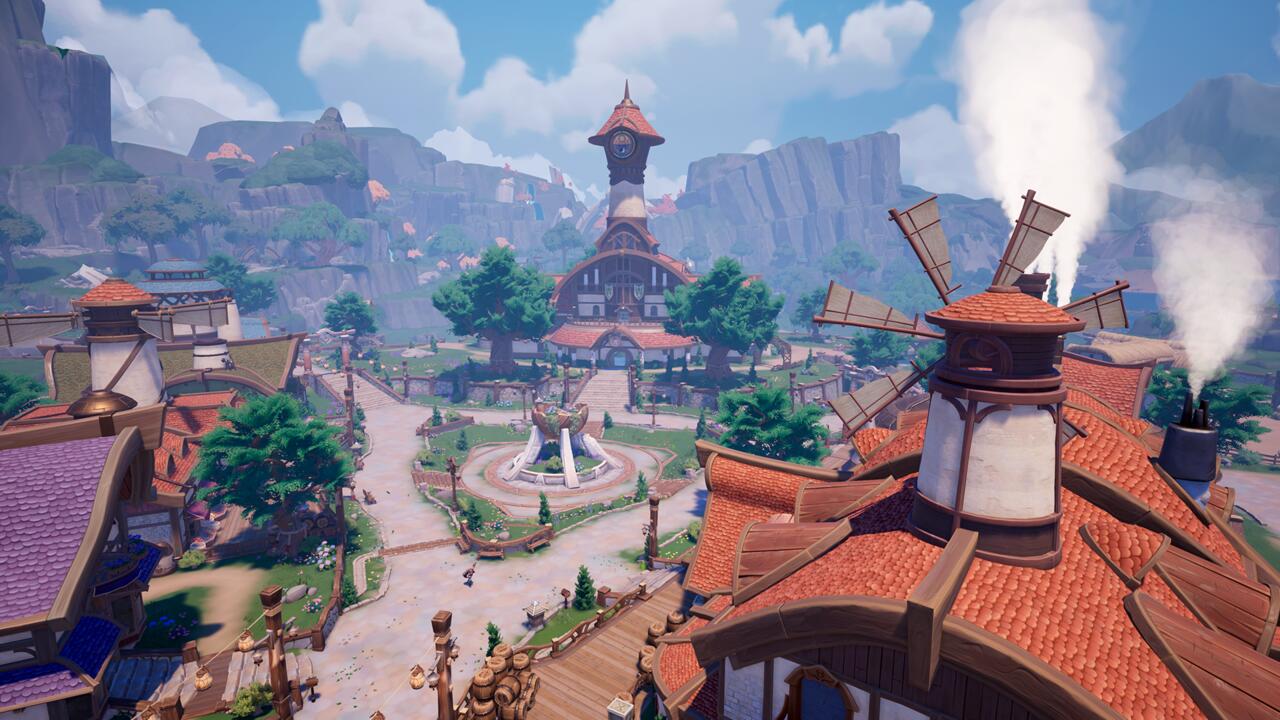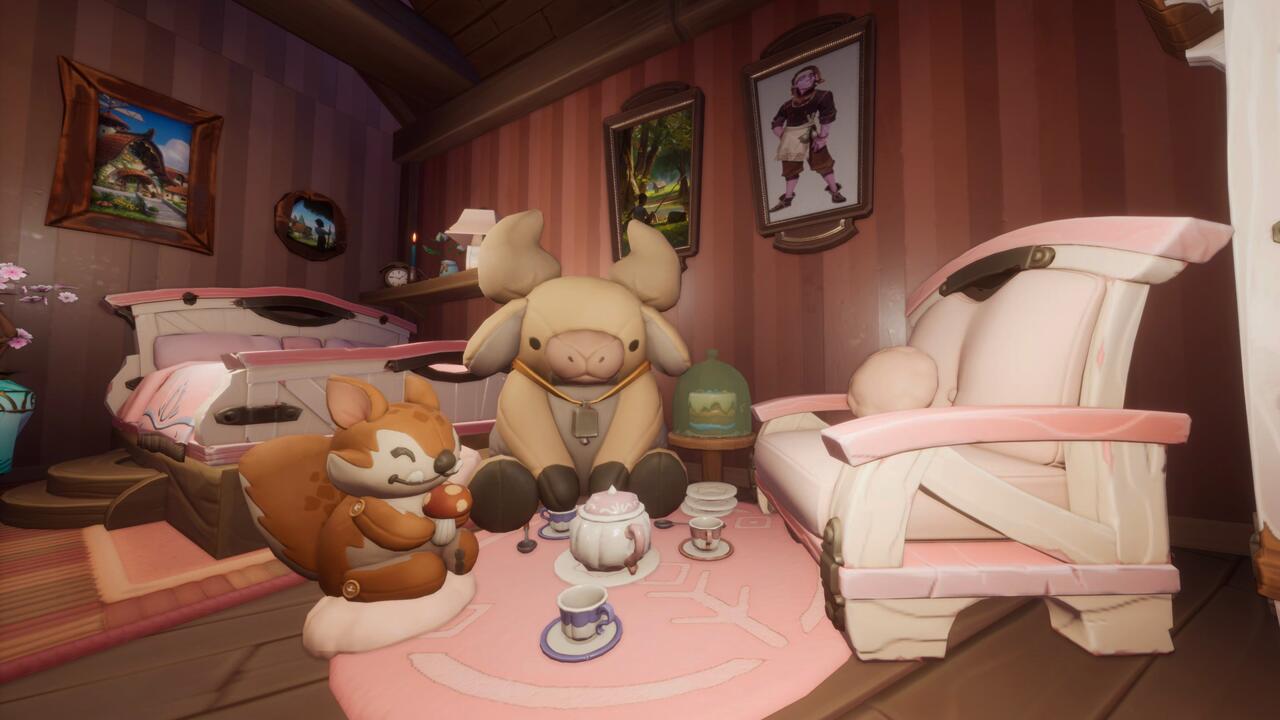
So far, the biggest games of 2023 have tasked players with slaying demons, gunning down the undead, wielding legendary weapons, partaking in streetside brawls, and engaging in large-scale battles between behemoths. And while I have gleefully partaken in nearly all of these festivities, I have found myself longing for something a bit different–something that pushes combat aside in favor of allowing me to explore a world filled with critters and characters not actively looking to fight me. Fortunately, Palia exists.
An upcoming, free-to-play MMO focused on creativity and coziness rather than combat, Palia is a joy to play. The game eschews the more dreaded hallmarks of its genre–overt fetch quests and inconsequential stories and characters, to name a few–to create something more engaging than many MMOs yet larger scale than many farming sims. With dazzling cutscenes, characters you actually want to get to know (and perhaps even date), and satisfying gameplay abundant in things to do, Palia–even in its beta state–shows a lot of promise and packs in a ton of joy.

After making my avatar in the game’s character creator–which surprised me with its breadth of different hair textures and darker skin tones, as well as its commitment to not gendering its two body types–the game kicks off with you emerging from a cloud of purple ether into the world of Palia. In this land, humans are an extinct species–long-lost creatures whose culture is now carefully studied by archaeologists like Jina, the first inhabitant of Palia you encounter. However, Jina explains that several humans have been emerging from the void recently, and she and her fellow Palians are baffled as to why this phenomenon is happening.
Following a brief conversation with the brilliant-yet-eccentric Jina, you are encouraged to introduce yourself to the residents of Kilima Village and set up camp at a nearby plot of land while you attempt to figure out just what you are meant to do in this strange new world. Fortunately, the town is filled with helpful neighbors who are quick to take you in and give you the tools that open up the game with several modes of play, such as fishing, cooking, crafting, farming, mining, hunting, collecting, and general homemaking.
Though I tend to be the type of person who gravitates towards one or two mechanics in a game, I was surprised by how enjoyable just about every aspect of the game is. Exploration, which is eventually aided by your trusty gilder, is a lot of fun and risk-free thanks to there being no health bar in Palia. The fishing minigame, while similar to others I’ve interacted with, is far less needlessly complex, as instead of interacting with a gauge or some form of meter, you simply follow the fish with your cursor as you reel it in. Decorating your plot of land is easy thanks to the game’s build mode and intuitive design tools, while a wide catalog of crafting items (and the ability to learn new crafting recipes while crafting already learned recipes) keeps your interiors feeling fresh.

Palia is primarily driven by taking on quests and grinding out materials to craft bigger and/or better items, with progression resembling games more like Animal Crossing or Disney Dreamlight Valley, albeit with a faster day-night cycle than the former. This is to say things do take a bit more time than they would in other life sims that permit you to quickly jump forward in time, so the game is best played a bit more gradually. However, while all this is going on you are also able to form bonds with Palia’s residents and unfurl both their stories and your own, which help keep the game feeling full of things to do.
This feeling of abundance is the most satisfying part of Palia. While MMOs can quickly feel stale, and character-driven life sims can grow repetitive if NPCs recite the same tired lines each time you speak to them, Palia continuously felt fresh and rewarding during the time I spent with it. Character dialogue and schedules are often changing, and when you ask your neighbors what gifts they’re interested in this week, you are often given bits of story along with the desired item, making you feel more connected to them and their lives. Furthermore, it feels as if there are always new quests to grab, things to do, or people to see–and that’s without playing alongside other players. This wealth of content makes any downtime a lot more bearable. While I might have been resigned to wait 100 minutes for my 100 pieces of lumber to transform into planks, there were enough things to do around the town and surrounding areas that I didn’t feel annoyed. Sure, everything from building up relationships to constructing the home of your dreams undoubtedly takes time, there were so many other things to do that these waits felt natural rather than grating or stifling.
Additionally, I think the general atmosphere of Palia helps to make any waiting worth it. Everything from the game’s characters to its environments are charming, interesting, and vibrant. Its palette is abundant in mythical purples, lush greens, crystal blues, and other brilliant jewel tones, and its characters feel a bit like a cross between Fornite and Netflix’s She-Ra in terms of design. Furthermore, I was immediately drawn to so many townsfolk, and was impressed by how different from one another they are. I also appreciated that all the love and care didn’t reside solely with the game’s romance candidates; while Kenyatta, Tish, Tamala, and Hassain could easily leave me blushing, Ashura, Hodari, and Badruu were also a joy to speak to. Though I’ve always been very romance-minded when it comes to life sims, this was one of the rare instances where I was actively trying to improve my friendships, too. Fortunately, the game makes it easy to work towards love and friendship (and everything else, really), with character and quest trackers and thorough menus that keep you organized and informed.
Now, so far all of my praise towards Palia has been directed at the game as if it were an entirely solo experience, of which it is not. That said, you might be wondering how its MMO elements work and if they add to the game or lessen the experience. Fortunately, it’s MMOs holding up during single-player that is often where the issues lie, and just as Palia shines in that regard, it also is a wonderful multiplayer experience. Seeing small handfuls of other players roaming around Palia–chatting to NPCs and participating in requisitions–makes the world feel even more alive. In addition, there are some things you can do that are greatly improved by working together, such as cooking complex recipes, hunting, and fishing. And, if you feel like kicking back rather than running about town, you can invite players back to your house to see your humble (or not so humble) abode.

The game’s social aspect is made even better by Palia’s commitment to fostering a kind and inclusive environment. Upon creating a character, you are asked to agree to Palia’s Village Values, which ask players to be responsible, kind, and helpful neighbors. While it’s difficult to tell how any rule breaking will be enforced while the game is in closed beta–or how players will behave once the servers open–the game’s tone and efforts to make diverse characters leave me optimistic. Another thing contributing to my optimism is how tertiary the game’s microtransactions feel. Whereas free-to-play MMOs can often feel predatory or play-to-win, Palia’s store solely features cosmetic items, meaning players can’t pay to skip waiting times, level up their skills, or buy a better axe. Though this could always be changed in the future–just look at Disney Dreamlight Valley’s ever-expanding list of microtransactions–so far this doesn’t seem to be the case, and I hope it stays that way.
For a new IP in early access, Palia is incredibly impressive and even more promising. I couldn’t help but be charmed by its world, and am eager to see more of it in the coming months. If you’re looking to try out the cozy MMO yourself, you can sign up for the game’s closed beta, which runs from now until August 10. On August 10, Palia’s servers will open up to everyone. As of right now, the game is only available on PC, though developer Singularity 6 has stated a Switch version is on the way.
Gallery
The products discussed here were independently chosen by our editors.
GameSpot may get a share of the revenue if you buy anything featured on our site.


